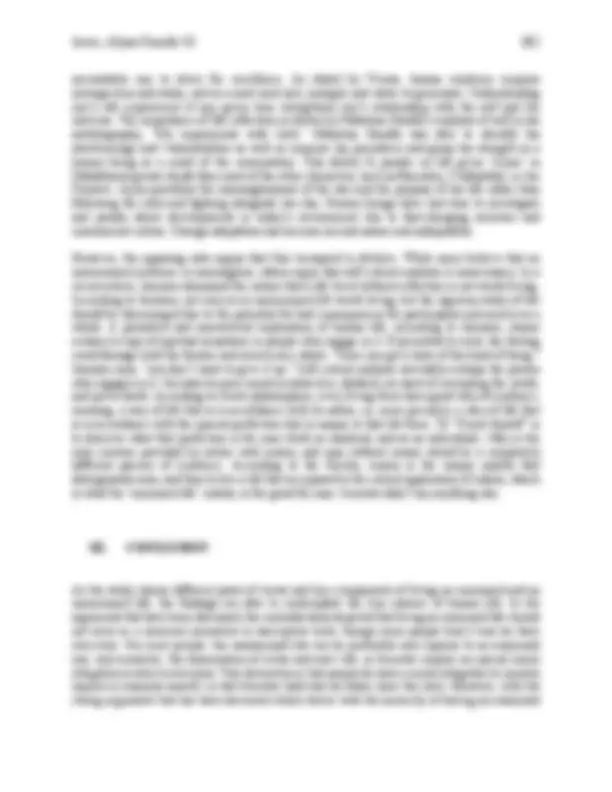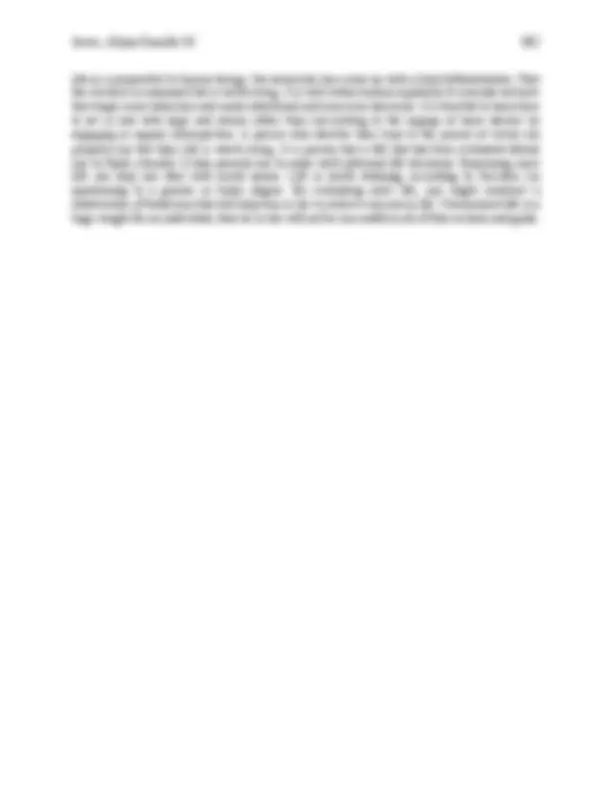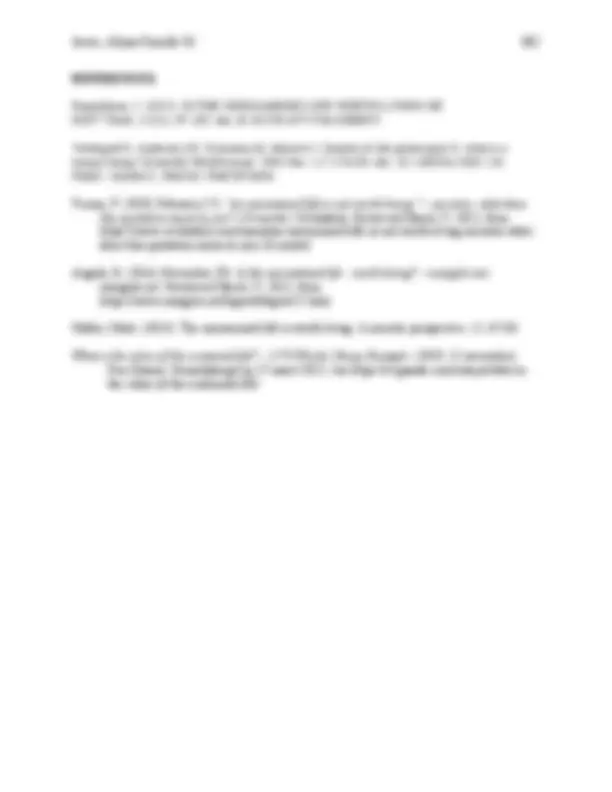





Study with the several resources on Docsity

Earn points by helping other students or get them with a premium plan


Prepare for your exams
Study with the several resources on Docsity

Earn points to download
Earn points by helping other students or get them with a premium plan
Community
Ask the community for help and clear up your study doubts
Discover the best universities in your country according to Docsity users
Free resources
Download our free guides on studying techniques, anxiety management strategies, and thesis advice from Docsity tutors
Hello! I hope these documents can help you in learning science education
Typology: Exercises
1 / 5

This page cannot be seen from the preview
Don't miss anything!




An examined life: Necessary to Human Existence? ABSTRACT. Philosophical arguments and methods to portray an examined life have been provided by different philosophers over the course of time. However, practicing this philosophical view has been regarded as a complex idea since it reflects opposing relevance to other rational interpretations. This study would provide information about the significant contrast of a human person living an examined and unexamined life. These two subjects will be analyzed based on its relativity to a more purposeful life as a human person. One of the main objectives of this research is to outline what human life really is. This will serve as the basic foundation of understanding why should a human person shall be recognized to live an examined life. Since there are various studies that claims and contradicts with the relevance of living an examined life, providing data of the advantages and disadvantages in each of the two subjects will be given emphasis in this research. After comparing the advantages and disadvantages, a final differentiation will be delivered. The data that will be extracted from the differentiation would be used to prove the essence of various philosophical views about this topic mainly the argument of Socrates; “An unexamined life is not worth living” (Socratic method). At the end of this research, the aim is to provide a deeper understanding and enhanced contemplation of the true essence of our human existence. I. INTRODUCTION From its early beginnings, one of the agendas of philosophy is to make the idea of the examined life and its quest for knowledge a central element of human life. Philosophy requires a person to evaluate his or her life in order to reach crucial fundamental goals in life. Examining one's life can take numerous shapes. Famous philosophers, Socrates and Nozick , analyze life in order to convey important knowledge about life that has been examined and life that has not been explored. As Socrates reiterates, “We must examine and understand the universe that dwells within our own soul.”. That gaining understanding and wisdom about life itself should be necessary in able to live a fruitful life. However, there are various claims and contradictions in this topic mainly because of its extremely formative points. At the beginning of this research paper, the researcher will try to explain and elaborate what human life is. This will serve as the basic foundation for the readers to understand the its core principles. In consideration to the various arguments that have been developed, this study will deliver and propose key components that supports different points of views relying on living an examined and an unexamined life. By the end of this paper, the researcher came up with a final differentiation that support gathered information and views in the pursuit of one’s well-being. This will focus on citing the relevance of having an examined life and vice versa in accordance to living a more purposive life as a human being. The data that will be gathered will come from observational studies about the said topic.
The life of a human being is a complex subject to discuss, and many people believe that attempting to comprehend life and what it means to be human is fruitless. We feel that we must attempt to comprehend life and grasp its numerous facets because learning to know the underlying principles of how life is lived to the fullest can be quite beneficial to us. Recognizing the good and evil forces in life allows us to make the best use of the positive ones. Being human entails balancing hundreds of extremes. Sometimes we must avoid these extremes, but other times it appears that we must pursue them in order to gain a deeper understanding of life. When the mind and feelings intertwine, we become whole. Thus, this is the secret of our hearts as human beings. When reason and feelings are perfectly balanced, and the mind and body are in perfect harmony, a whole new quality arises, one that is neither feeling nor reason, but something deeper and more complete. We barely cover enough biology in this paper to explain what the underlying inner conflicts are about. Understanding these conflicts provides us with the solution to many of life’s issues. Most people find it difficult to envisage joys greater than sensory pleasures. “What could be the source of such joy?” But there is a delicacy, a richness, a genuine joy of being alive that comes when we are totally present and life is in harmony someplace deep within us. We call this deep joy of life or the so called “experiencing the meaning of life.”. There are different philosophical perspectives that revolves in the essence of experiencing the meaning of life. An unexamined life is not worth living, Socrates emphasizes by this statement that a human life that is not scrutinized is devoid of significance and purpose. To achieve full human status, we must employ our highly evolved cognitive faculties to elevate our existence above that of primitive beasts. Because if we don’t think, we’re just animals, eating, sleeping, working, and reproducing. Nozick, like Socrates, is quick to point out that portraits are ideal for describing an individual's interior feelings (Cynthia). Socrates believes that the outside should reflect what is felt on the inside. Nozick describes life as an explanation of possibilities from one logical mind to the next. Part of the discrepancy has to do with the truth about Socrates. Nozick believes with Socrates that life without meaning isn't worth living. Both Nozick and Socrates look at a person's life by reflecting on their ideals and making the greatest choices and decisions they can. Nozick, on the other hand, focuses on a portrayal, whereas Socrates analyses life from a philosophic standpoint. Nozick's perspective on an unexamined life is that one can't bring forth the essential meaning of life because one can't express oneself in public. When they study life, both Nozick and Socrates assess the same life. Socrates had a variety of qualities and proactive viewpoints that ensured engagement in a social conversation. Both Socrates and Nozick challenge the individual being examined to bring out the intrinsic worth of self-reflection in his or her life (Taylor 20). Reality, according to Nozick, has many different features and dimensions, such as intrinsic value, depth perfection, and expressiveness. When Socrates examines a person's life, he displays these dimensions. When it comes to examining lives, both philosophers make similar gains. An examined life benefits a person by teaching them how to make good decisions and live a good life. Examined life dictates that one must be cautious with one's goals and the manner in which one achieves them (Kagan). The quality of one's life is really important. It is not the length of one's life that matters, but the quality of one's life. An analyzed life is one that has a narrator and follows a predetermined path toward reaching significant objectives. An examined life
life as a purposeful to human beings, the researcher has come up with a final differentiation. That the virtuous or examined life is worth living. It is well within human capability to override instincts that shape some behaviors and make intentional and conscious decisions. It is feasible to learn how to act in line with logic and reason rather than succumbing to the urgings of basic desires by engaging in regular introspection. A person who devotes their time to the pursuit of virtue can properly say that their life is worth living. It is proven that a life that has been evaluated allows one to think critically. It also permits one to make well-informed life decisions. Examining one's life can help one deal with moral issues. Life is worth studying, according to Socrates, by questioning to a greater or lesser degree. By evaluating one's life, one might construct a substructure of behaviors that will help him or her to achieve success in life. Unexamined life is a huge weight for an individual, thus he or she will not be successful in all of their actions and goals.
Famakinwa, J. (2012). IS THE UNEXAMINED LIFE WORTH LIVING OR NOT? Think, 11 (31), 97-103. doi:10.1017/S Ventegodt S, Andersen NJ, Kromann M, Merrick J. Quality of life philosophy II: what is a human being? ScientificWorldJournal. 2003 Dec 1;3:1176-85. doi: 10.1100/tsw.2003.110. PMID: 14646012; PMCID: PMC5974854. Verma, P. (2020, February 17). "an unexamined life is not worth living." – socrates. what does this quotation mean to you? (10 marks). Civilsdaily. Retrieved March 27, 2022, from https://www.civilsdaily.com/mains/an-unexamined-life-is-not-worth-living-socrates-what- does-this-quotation-mean-to-you- 10 - marks/ Angelo, R. (2016, November 29). Is the unexamined life - worth living? - roangelo.net. roangelo.net. Retrieved March 27, 2022, from https://www.roangelo.net/logwitt/logwit55.html Maller, Mark. (2013). The unexamined life is worth living: A socratic perspective. 12. 67-83. What is the value of the examined life? - 1170 Words | Essay Example. (2019, 22 november). Free Essays. Geraadpleegd op 27 maart 2022, van https://ivypanda.com/essays/what-is- the-value-of-the-examined-life/